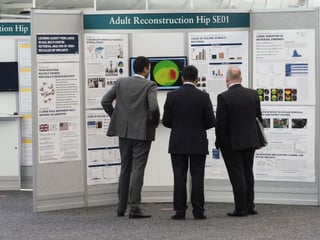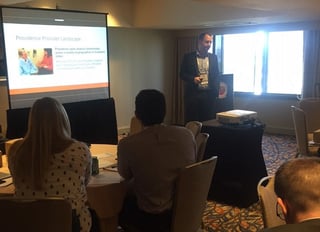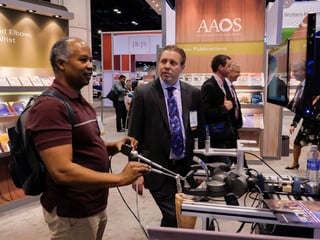
You will have several opportunities to hear AJRR Steering Committee Chair Kevin J. Bozic, MD, MBA, and AJRR Medical Director David G. Lewallen, MD, speak at the American Academy of Orthopaedic Surgeons (AAOS) 2018 Annual Meeting. Today we will have a conversation with each. Our blog will "sample" some of the salient points they plan to make during their respective presentations. We are also alerting you to a poster on the correlation between hospital size and revision indication and where total joint arthroplasty (TJA) revision surgery is performed. All three offerings have high relevance to registry participants. If your organization is already an AJRR participant, don't forget to register for the AJRR In-person User Group Network (Unet) Meeting.
A Conversation With Speaker Kevin J. Bozic, MD, MBA, About PROMs Pay-Back

Q1: How have you and your colleagues structured the Patient-Reported Outcomes in Orthopaedics - Why and How We Collect Them Instructional Course Lecture (ICL)?
A1: As individuals who have helped champion the use of patient-reported outcomes (PROs) in orthopaedic surgery, David C. Ayers, MD, Judith F. Baumhauer, MD, and I will each discuss our experience in building programs that use PROs in the process of patient care and clinical decision making, not just as a research tool. We will spend some time talking about why patient-reported outcome measures (PROMs) are important to collect, how to collect them in your practice, and how to use them to improve the quality and value of the care we provide to our patients. The moderator for the session, Eric C. Makhni, MD, MBA, also has experience implementing a PROMs program in a large, integrated delivery system.
Q2: Why is it particularly important to measure PROMs in joint replacement, compared to other procedures?
A2: Patients who seek joint replacement for the management of hip or knee arthritis have one primary goal: to reduce their pain and improve their function and overall quality of life. The best way for us to understand how effective we are in helping our patients achieve that goal is to measure pain, function, and quality of life using validated PROMs for every patient at each encounter. The challenge has been not only to integrate PROMs into the day-to-day work processes involved in clinical care - and this ICL will review several ways that has been done successfully - but also ways we may be able to gather this information even more efficiently in the future. PROMs are not only used to assess a patient's appropriateness for surgery, but also to better elucidate the effect of underlying patient-specific risk factors, such as anxiety and depression, that may not be reported in a patient's past medical history, yet could have a significant impact on the results of surgery. I think of PROMs as business intelligence for total joint replacement surgeons, and they provide information that can be essential to helping us maximize the value of care we deliver to each one of our patients.
Q3: Patient buy-in is important to the collection of PROMs. How do you engage your patients in completing PRO surveys?
A3: Just like any other test or procedure, it's important that we as providers explain to our patients the purpose of PRO surveys. We explain to our patients that this is a simple test we use to better understand the impact of their arthritis on their pain, function, and quality of life, and to help inform the most appropriate and effective treatment for their condition. When PROs are part of the process of care and patients see them being used to help care for them, buy-in quickly follows. While I can't say all, certainly many of my patients recognize the value of this information in informing the care for their condition. View the video of one of my patients talking about why he found this information useful in the treatment of his knee arthritis.
A Conversation With Speaker David G. Lewallen, MD, About Registry Financial Pay-Back

Q1: How have you and your colleagues structured the What Can a Registry Do for Me symposium?
A1: In this symposium, attendees will learn how registry participation can help practitioners see how they compare to national benchmarks, identify best clinical practices, determine areas for individual practice improvement, and thus improve the patient care they provide. Registries also have a role in providing real-world information on implant performance and thereby informing implant selection. They can help in the early and ongoing assessment of the value of new technologies as they become available. All of the above information is also of great importance in discussions around the relative value of arthroplasty procedures and the level of resources and reimbursements provided for these procedures. This symposium will review the major positive financial impact of National Registry data on health care systems around the world by improving the quality of care provided. This information helps explain why registry participation is a big part of the current conversation in the U.S. surrounding proposed health care reform programs and possible payer incentives for surgeons and hospitals.
Presentations include:
- Improve My Finances: AJRR: A Quality Registry and What It Can Do for You
- Physician Quality Reporting System (PQRS), Merit-based Incentive Payment System (MIPS), Medicare Access and CHIP Reauthorization Act of 2015 (MACRA), Maintenance of Certification (MOC) (David G. Lewallen, MD)
- ACE, Bundled Payments for Care Improvement (BPCI), Comprehensive Care for Joint Replacement (CJR), Bundled Payments for Care Improvement Advanced (BPCI-A) (Kevin J. Bozic, MD)
- Identify Clinical Best Practices and Improve Patient Care
- Opioid Use (Robert S. Namba, MD)
- Identify Clinical Best Practices and Improvement of Patient Care (Michigan Arthroplasty Registry Collaborative Quality Initiative [MARCQI]): Improving Perioperative Blood Management (Brian R. Hallstrom, MD)
- Identify Clinical Best Practices and Improvement Patient Care (Swedish Registries, Maziar Mohaddes, MD)
- How to Use Your Own Data
- Australian Orthopaedic Association National Joint Replacement Registry (AOANJRR) (Richard De Steiger, MD)
- New Zealand (Peter A. Devane, MD)
- Function and Outcomes Research for Comparative Effectiveness in Total Joint Replacement (FORCE-TJR) (David C. Ayers, MD)
- Implant Selection and New Technology
- United Kingdom (Martyn Porter, MD)
- NARA (Ove N. Furnes, MD)
- Australia (Stephen Graves, MD)
- Industry Perspective (Paul Voorhorst)
- Moderator: Henrik Malchau, MD
Q2: How can quality registry participation improve finances in terms of reimbursement through government or other payers?
A2: My presentation focus will be on PQRS, MIPS, MACRA, MOC, and discussions about how registry participation may or may not be recognized as part of their qualifications for reimbursement. Dr. Kevin Bozic similarly will cover value-based payment programs, such as ACE, BPCI, CJR, and BPCI-A.
All types of payers would like to have documentation of quality of care to help guide any financial incentives for providers. Registry participation has the potential to provide that documentation. As a national quality data registry, AJRR currently has the tools in place needed to provide the most accurate and complete picture of the arthroplasty experience in the U.S. The Registry provides a comprehensive platform that participants can use for data gathering, analysis, trending, and national benchmarking that can guide and track quality improvement. This is exactly what the payers are looking for.
Q3: Do you expect to see much state activity around registry use and reimbursement measures?
A3: The short answer is "yes." Currently, there are state-based registry efforts in California, Michigan, and Virginia, with others under discussion or development. There has also been state-level legislation addressing PRO collection and quality measures that may lead to increased registry development and participation. In Texas, State Bill 55 is currently focused on a PROs pilot. The California Joint Replacement Registry (CJRR), now part of AJRR, was an early leader in PRO collection efforts and public reporting. The Michigan Arthroplasty Registry Collaborative Quality Initiative (MARCQI), one of our symposium presenters, has just published their five-year report on a range of statewide quality improvement programs which have positively impacted patient care in Michigan. These efforts can and should be complimentary and cooperative moving forward.
A Conversation With AJRR Director of Analytics and Co-Investigator Caryn D. Etkin, PhD, MPH, About Where TJA Revision Surgery Is Performed

Q1: What is the data source for your study Is There a Correlation Between Hospital Size and Revision Indication and Where TJA Revision Surgery Is Performed?
A1: This poster provides a meaningful look at TJA revision surgery and where it is performed based on data from Medicare patients undergoing these procedures.
Q2: What type of questions does your analysis address?
A2: The study uses the data to answer questions like 1) Is there an association between hospital size and where a revision is performed? How frequently in the first year do patients return to the same surgeon or hospital where the primary procedure was performed when the indication is 2) infection, or 3) dislocation? The main findings of the study are that around 80 percent of Medicare patients who require revision in the first year actually do go back to the original hospital where surgery was performed. However, some patients with certain problems like infection, or those with issues that arise several years after surgery are much more likely to seek care at another hospital and from a different surgeon. These data have important implications for long-term survivorship results from any U.S. registry effort and highlight the need for comprehensive nationwide data gathering.
The lead author on the study is AJRR Annual Report Editor Terence J. Gioe, MD. Additional co-investigators include Edmund Lau, MS, and Heather Watson, PhD, of Exponent, Inc., along with AJRR Medical Director David G. Lewallen, MD, AAOS Registry Oversight Committee (ROC) Chair Daniel J. Berry, MD, and myself. I encourage attendees to stop by Poster #P0168 in Academy Hall B and see the findings that address the above questions and more.
The AJRR In-person Unet Meeting

Those who are already involved in the implementation and management of the AJRR at their institution are invited to attend the In-person Unet Meeting in New Orleans. Register here for the March 7, 11:30 a.m. - 1:30 p.m. event that will be held at the Hilton New Orleans in the Magazine Meeting Room. Presentations, lunch, technology updates, and networking will be provided. Highlights of the meeting will include a presentation by Providence Health and Services' Kevin Fleming and Paul Duwelius, MD. They will share how their health system and physicians partner to use AJRR participation and tools to drive research and best practice. In addition, Dr. Bozic will present PRO content.
The AAOS Resource Center

AJRR will have an additional presence at the AAOS Resource Center from March 6-10. Meet AJRR staff and check out new resources at the booth, ranging from the AJRR 2017 Annual Report, PROMs Guide, Level II Patient Risk Factors, Comorbidities, and Complications Guide, and more. Experience a RegistryInsights™ demonstration, or checkout the new AJRR blog! We look forward to seeing you. You'll find us in Academy Hall B. We'll also be using the #AAOS2018 to communicate on the floor updates if you care to follow us on social media.
For more information about AJRR's RegistryInsights platform, speak with a Business Development Representative at (847) 292-0530 ore Request a Demo today!
Be sure to leave a comment in the form below!

